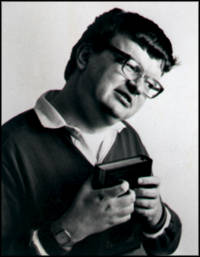THE AMAZING KIM PEEK
The newspaper reports that Kim Peek, age 58, died December 19th. Mr. Peek was diagnosed as severely mentally retarded as a child. In fact, throughout his life he need around the clock supervision. He wasn’t even able to dress himself or do simple things such as comb his hair. Born in 1951, his parents were advised he should be put in an institution, but they cared for him at home instead. This required constant care every day because of Kim’s mental problems. After his parents divorced in 1975, his father took over the around the clock care of Kim. Doctors said he would  be dead at fourteen, but he lived to age fifty eight thanks to the loving care of his parents. In fact, the last half of his life was very rewarding for him. He even became famous.
be dead at fourteen, but he lived to age fifty eight thanks to the loving care of his parents. In fact, the last half of his life was very rewarding for him. He even became famous.
So, why am I telling you about Kim? The answer is that not many people would know who Kim Peek was, but if told that Mr. Peek was the basis of Dustin Hoffman’s portrayal in the 1988 movie Rain Man, co staring Tom Cruise, you would probably make the connection. The movie won four Academy Awards with Hoffman playing the role of a mentally challenged man who had a photographic memory and was a mental genius while still mentally challenged in every other area of his life. Kim Peek was an amazing savant who couldn’t tie his shoes, but was mega genius with a photographic memory who retained everything he read, heard or learned. He read eight books a day and could repeat word for word nine thousand books. He only took ten seconds to read a page and not only that he could read two pages at a time. One eye read the right page and the other the left page. Investigators determined he was a true genius in at least fifteen subjects. He remembered everything he had learned about a subject and could repeat it exactly.
The writer of the screen play for Rain Man, Barry Morrow, had met Peek and Morrow was astounded by Peek’s mentral ability as well as his ability to remember everything. Murrow wrote the movie script based on Peek. When Dustin Hoffman got the part of Peek in the move he began spending time with Peek who was thirty seven at the time. Peek was very introverted and wouldn’t even look at someone’s face. He related to Hoffman, however, and began to open up. Hoffman convinced Peek’s father that he was wrong to keep Kim away from others and that he should "share him with the world." That led the father to encourage Kim to be more public. His father arranged for Kim to go on stage and speak to audiences who would ask him the most difficult questions they could think up and which he almost always correctly answered on all subjects. The experience opened Kim up and he became an outgoing person who enjoyed the experience. Eventually he spoke to audiences all over the world traveling almost three million air miles and talking to some sixty million people before he died. An amazing story about an amazing man
In my fifty years of law practice, I've dealt with a substantial number of babies, children and adults who had mental challenges. Some very serious and some not as serious. When the cases involve a baby with brain injury it is particularly devastating for all concerned. The dreams for the child are destroyed and the relationships of the family changed forever. Divorce is a frequent consequence of having to devote all the attention to the child. Siblings suffer and the home becomes a place of twenty four hour care devoted to the child without hope of an real change ever. When I read about Kim Peek it makes me think how little we know about the human brain and it's ability to adjust, revise and even compensate for deficits. We know from reports of those who were in long term comas, but then came out that they had an awarness of what was said and what was going on around them. One wonders about a similar kind of "locked in syndrome" when it comes to those with brain injuries. Certainly in Kim Peek's case there was a totally different person hiding inside until he began his public talks which showed a whole different person living inside him. I hope one day we will devote the same kind of research to mental illness and brain injuries we devote to other major diseases.
